March for Science Puts Earth Day Focus on Global Opposition to Trump
SPECIAL FEATURE, 24 Apr 2017
More than 600 marches held around the world, with organizers saying science ‘under attack’ from a White House that dismisses the threat of climate change.
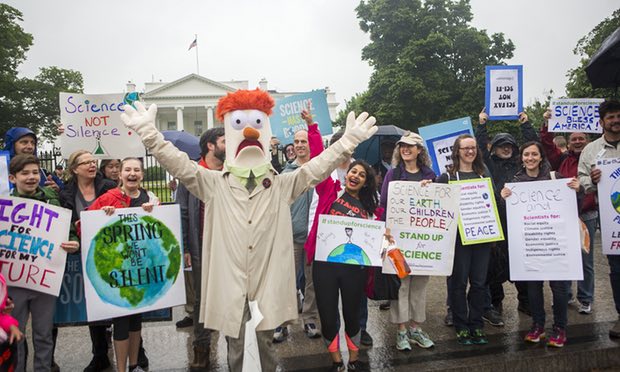
Members of the Union for Concerned Scientists pose with Muppet character Beaker, in front of the White House. Photograph: Jessica Kourkounis/Getty Images
22 Apr 2017 – Hundreds of thousands of climate researchers, oceanographers, bird watchers and other supporters of science rallied in marches around the world on Saturday, in an attempt to bolster scientists’ increasingly precarious status with politicians.
The main March for Science event was held in Washington DC, where organizers made plans for up to 150,000 people to flock to the national mall, although somewhat fewer than that figure braved the rain to attend. Marchers held a range of signs. Some attacked Donald Trump, depicting the president as an ostrich with his head in the sand or bearing the words: “What do Trump and atoms have in common? They make up everything.”
More than 600 marches took place around the world, on every continent bar Antarctica, in events that coincided with Earth Day.
The marches, the first of their kind, were officially non-political. They were however conceived by three US-based researchers – Caroline Weinberg, Valorie Aquino and Jonathan Berman – after Trump’s inauguration. Organizers have said science is “under attack” from the Trump administration and many protesters excoriated the president with signs that likened him to a dangerous orange toxin or disparaged his now defunct university .
Trump released a statement that insisted his administration was committed to preserving the “awe-inspiring beauty” of America, while protecting jobs.
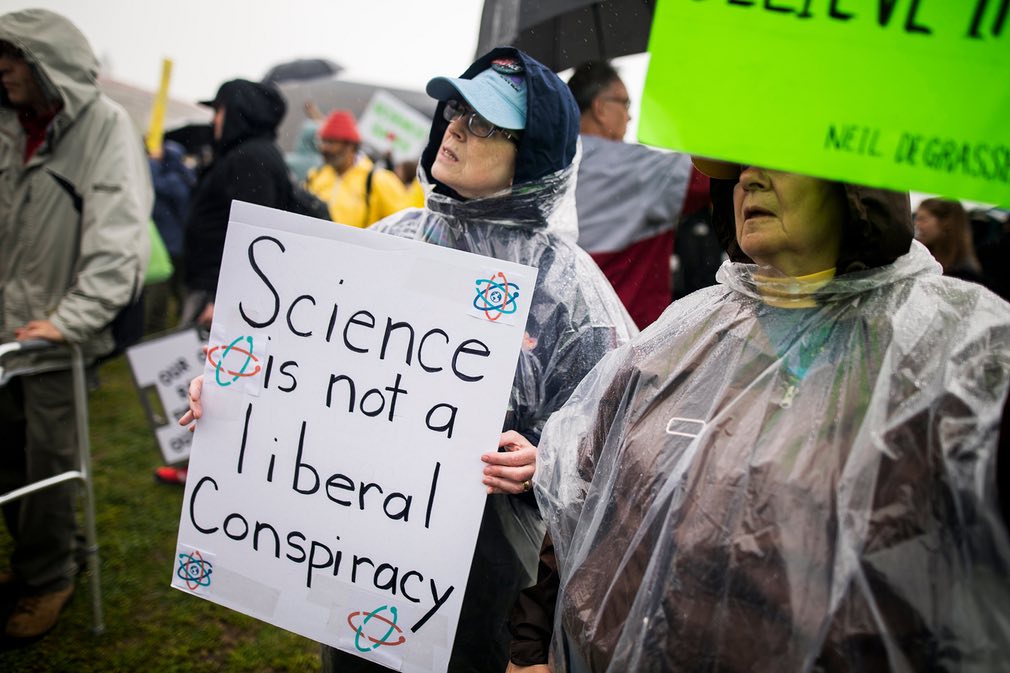
Protesters in Washington DC brave poor weather to get their message across. Photograph: Jim Lo Scalzo/EPA
“Rigorous science is critical to my administration’s efforts to achieve the twin goals of economic growth and environmental protection,” Trump said. “My administration is committed to advancing scientific research that leads to a better understanding of our environment and of environmental risks.
“As we do so, we should remember that rigorous science depends not on ideology, but on a spirit of honest inquiry and robust debate.”
“There’s very low morale among government scientists because science is under assault from this administration.”
— Michael Mann
The US marches were some of the last to take place, following hundreds across the world. A common theme among protesters was a worry that politicians have rejected science-based policies.
“I’m encouraged by the marches I’ve seen already taking place around the world,” said Rush Holt, a former congressman and head of the American Association for the Advancement of Science. “For generations scientists have been reluctant to be in the public square. There is a lot of concern.”
Speakers in Washington included Christiana Figueres, the former United Nations climate chief and climate scientist Michael Mann. Hundreds of scientific institutions, environmental groups and union groups partnered with the march.
“There’s very low morale among government scientists because science is under assault from this administration,” Mann told the Guardian. “That being said, events like this will lift the spirits of scientists. They are finding a voice.”
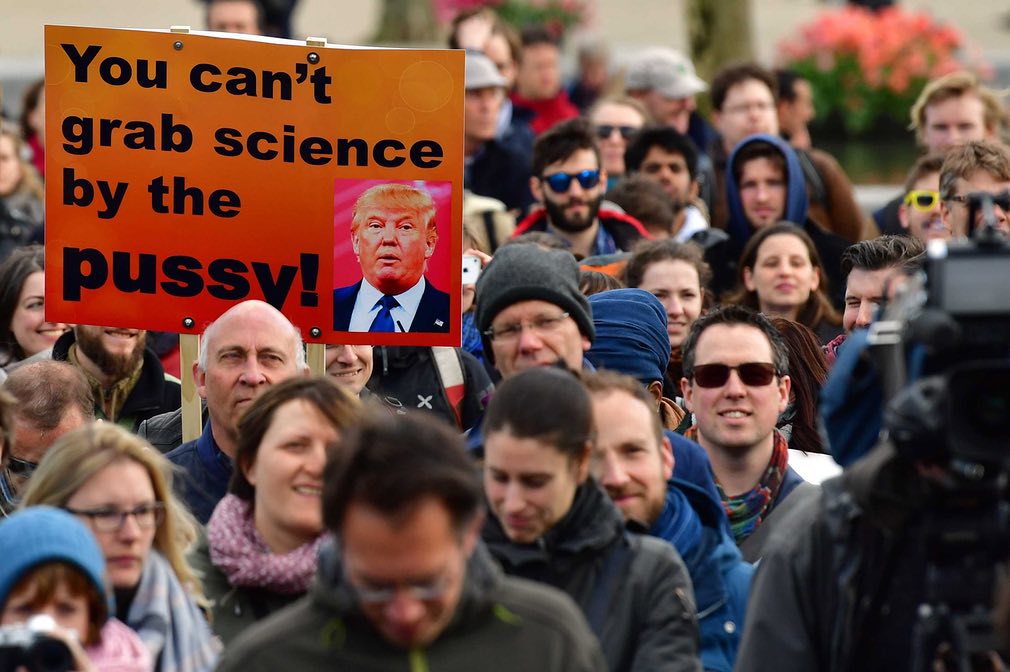
A marcher in Amsterdam makes reference, in blazing Dutch orange, to one of many controversies involving Trump in last year’s US election. Photograph: Robin Utrecht/EPA
Pharmaceutical companies, concerned about the impact on research talent of Trump’s attempts to ban or restrict travel from certain Muslim-majority countries, risked his wrath by supporting the march. In a video, Pfizer said it was “proud to stand behind our scientists”.
Trump has galvanized scientists with his comments about climate change, which he has called a “hoax”, as well as questions about whether vaccines are safe and threats to cut funding to universities that displease him.
The White House’s recent budget proposal would remove around $7bn in science funding, with the National Institutes of Health, which funds medical research, bearing much of the pain. Earth sciences, ranging from weather satellites to marine research to coastal preservation, are also lined up for severe cuts.
VIDEO: Thousands rally around the world for ‘March for Science’
Climate change was at the heart of the March for Science, spurred on by dismissals of the issue by Trump and his top advisers. Budget director Mick Mulvaney has said climate research is a “waste of your money”. Scott Pruitt, administrator of the Environmental Protection Agency, has erroneously denied that carbon dioxide is a primary driver of global warming.
Other areas of science have been all but abandoned. The president has yet to nominate administrators for Nasa and the National Oceanic and Atmospheric Administration, nor to appoint his own science adviser.
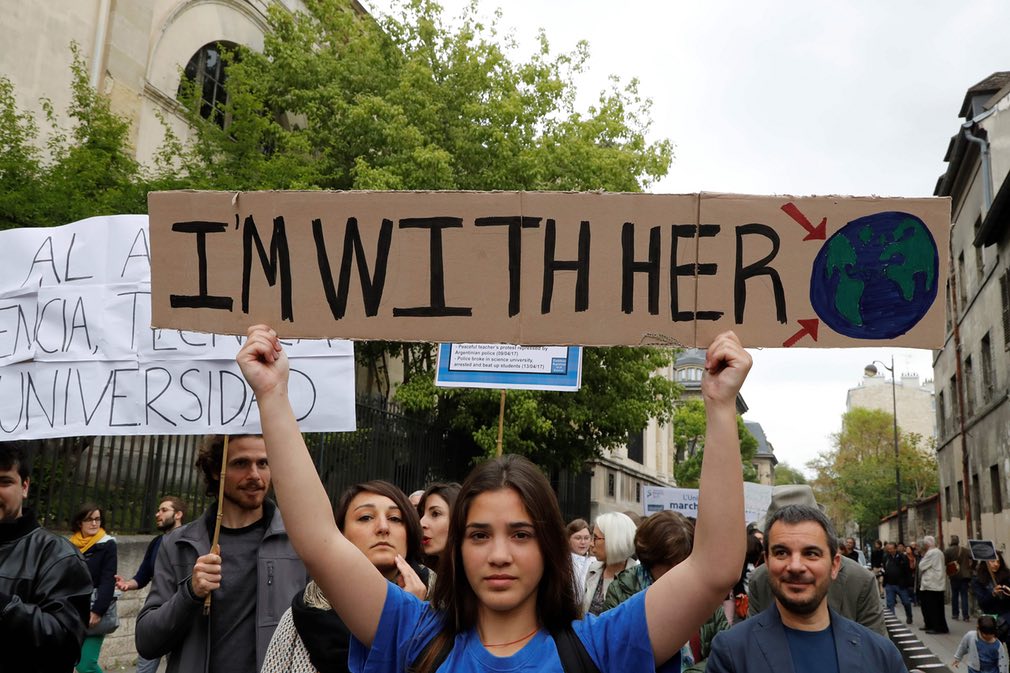
In Paris, a marcher repurposes a slogan used by Trump’s defeated opponent, Hillary Clinton.
Photograph: Francois Guillot/AFP/Getty Images
John Holdren, science adviser during Barack Obama’s presidency, said Trump had “shown no indication of awareness of the role of science and the role of science in government”.
“Scientists are understanding that they have to become activists, that they have to speak up, that they have to be heard,” he said. “The message isn’t, ‘Please save our jobs.’ Scientists would be in another line of work if they were just interested in their salaries. If funding for science is slashed, all of society will lose out.”
The march has proved controversial within the science community, which is typically reluctant to be overtly political. Some scientists have raised concerns that the marches will invite attacks by Trump and his supporters, or will fail to convince the public that science has inherent value.
But several famous voices have joined the cause. “Science has always been political but we don’t want science to be partisan,” Bill Nye, a prominent engineer and TV personality, told the Guardian.
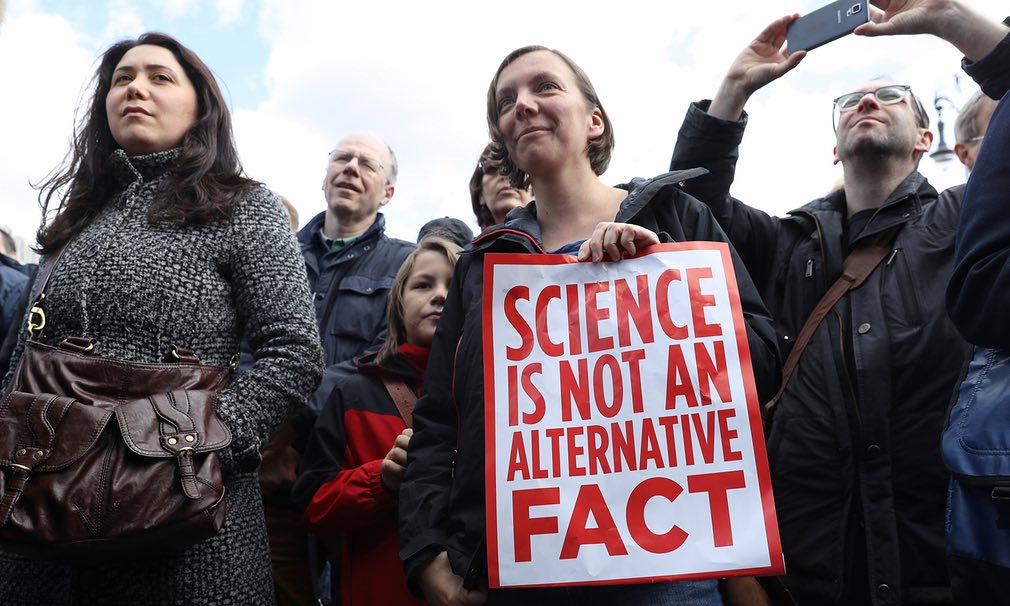
In Berlin, a protester makes reference to Trump adviser Kellyanne Conway’s infamous insistence that the White House can offer ‘alternative facts’ to the truth. Photograph: Sean Gallup/Getty Images
“Objective truths have become set aside and diminished and lawmakers are acting like a strong belief in something is as valid as careful peer review.”
Nye said science was in a “dangerous place” but hoped the march would help nudge Trump to a more amenable position.
“The president changes his mind quite frequently,” he said. “We want to influence the people who influence him. That’s our goal for the march.”
VIDEO: Head of EPA denies carbon dioxide causes global warming
Leland Melvin, a former Nasa astronaut who participated in two missions, criticized the administration’s plans to eliminate Nasa’s education budget.
“Doing that would keep people like me from getting a masters or PhD,” he said. “If we want brown people and women getting these degrees and get them involved in science, we have to fund it. The administration needs to get its head out of the sand.”
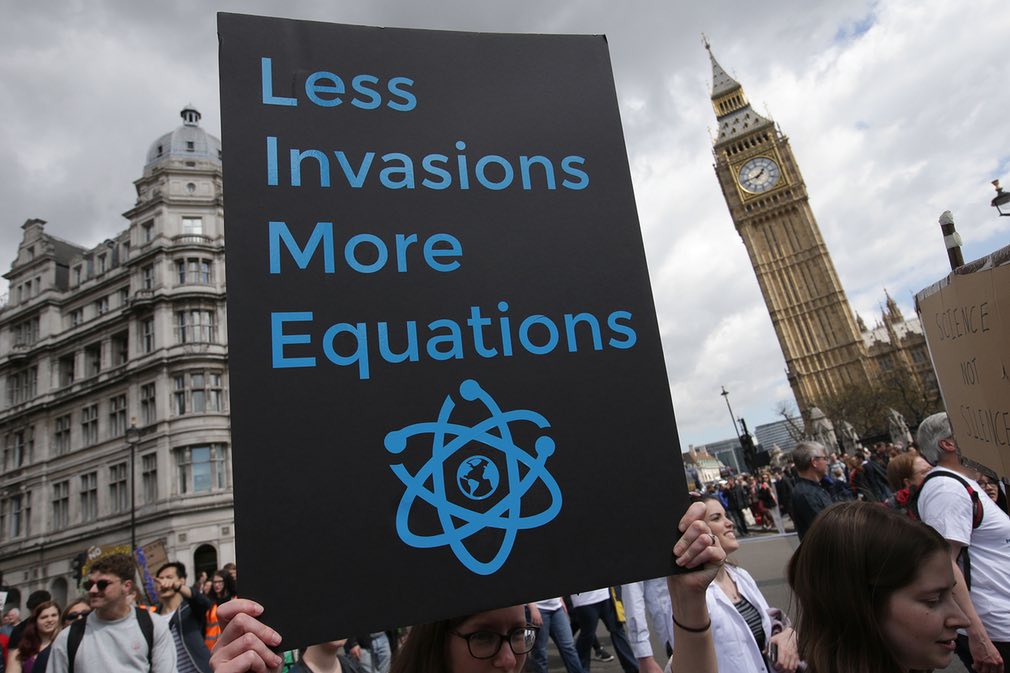
A protester in London opts for a generally pro-science message.
Photograph: Daniel Leal-Olivas/AFP/Getty Images
Cristian Samper, president of the Wildlife Conservation Society, said the march aimed “to celebrate science, not to politicize it”.
“Science is behind the good news and bad news about wildlife conservation ,” he said. “it has nothing to do with the fake news. Science is the antithesis of fake news.”
The marches came one week before the People’s Climate March, a series of large-scale events focused on climate change that will be more overtly political.

Some marchers, such as this one in London, went further, dressing the part as well as carrying messages.
Photograph: Daniel Leal-Olivas/AFP/Getty Images
“Attacks on science don’t just hurt scientists, they hurt scientists’ ability to protect the people, and climate change epitomizes that,” said Dr Geoffrey Supran, an expert in renewable energy at Harvard University.
“When politicians cater to fossil fuel interests by denying the basic realities of climate science and pursuing anti-science climate policy, they endanger the jobs, justice, and livelihoods of ordinary people everywhere.”
Go to Original – theguardian.com
DISCLAIMER: The statements, views and opinions expressed in pieces republished here are solely those of the authors and do not necessarily represent those of TMS. In accordance with title 17 U.S.C. section 107, this material is distributed without profit to those who have expressed a prior interest in receiving the included information for research and educational purposes. TMS has no affiliation whatsoever with the originator of this article nor is TMS endorsed or sponsored by the originator. “GO TO ORIGINAL” links are provided as a convenience to our readers and allow for verification of authenticity. However, as originating pages are often updated by their originating host sites, the versions posted may not match the versions our readers view when clicking the “GO TO ORIGINAL” links. This site contains copyrighted material the use of which has not always been specifically authorized by the copyright owner. We are making such material available in our efforts to advance understanding of environmental, political, human rights, economic, democracy, scientific, and social justice issues, etc. We believe this constitutes a ‘fair use’ of any such copyrighted material as provided for in section 107 of the US Copyright Law. In accordance with Title 17 U.S.C. Section 107, the material on this site is distributed without profit to those who have expressed a prior interest in receiving the included information for research and educational purposes. For more information go to: http://www.law.cornell.edu/uscode/17/107.shtml. If you wish to use copyrighted material from this site for purposes of your own that go beyond ‘fair use’, you must obtain permission from the copyright owner.